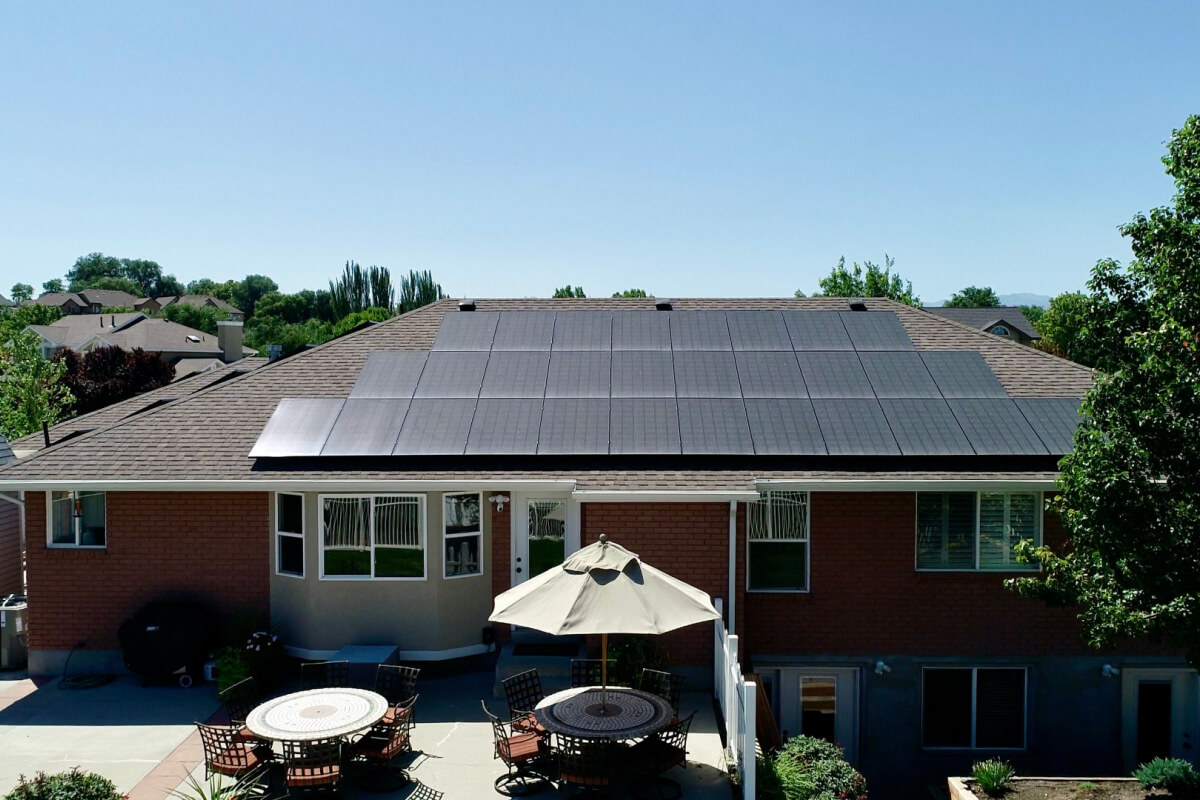What are black solar panels, how do they compare their blue counterparts and should you get them? In this Canstar Blue guide, we’ll answer common questions about black solar panels, including what they are, how they’re made, and how much they cost. We’ll explain the differences between black and blue solar panels, breaking down the pros and cons of each to give you a better understanding of this solar technology.
Advertisement
What are black solar panels?
Like blue solar panels, black solar panels are photovoltaic panels that convert sunlight into energy. While the difference between black and blue solar panels is minimal, in terms of which is more efficient (more on that below), black panels have become popular because of their sleek appearance that suits many modern homes.
How are black solar panels made?
Black solar panels in Australia are made with monocrystalline cells – different to the standard polycrystalline cells in blue solar panels. Monocrystalline cells are formed through a process that places molten crystals into pots under high temperatures and pressure to draw out their shape, forming blocks that can be cut up into thin wafers for use as energy-generating components. This process creates single crystal cells, also known as monocrystalline cells. Light interacting with single crystal cells (monocrystalline) reacts differently to standard polycrystalline cells, giving them a uniform black hue.
Black solar panels vs blue: Which is better?
While both black and blue solar panels are efficient at converting sunlight into energy, black solar panels convert 1% – 2% more sunlight into energy than blue panels. This increase in efficiency is slight though, meaning it may not make financial sense to pay more upfront for black solar panels when blue panels, which are typically less expensive, will do the job almost just as well. Often the choice between black and blue solar panels comes down to aesthetics rather than efficiency. Let’s explore the pros and cons of each in further detail:
Pros and cons of black solar panels
| Pros | Cons |
| Are said to absorb slightly more heat and light from the sun. | Usually more expensive for each panel, driving up the price of installation. |
| Are said to be more efficient and take up less space on a roof. | May not be readily available in all areas. |
| Feature a modern appearance that tends to blend in better with surroundings. | Not commonly produced by all manufacturers. |
Pros and cons of blue solar panels
| Pros | Cons |
| Less expensive and produceless waste when made. | Are said to be less efficient and don’t absorb as much sunlight, particularly in areas with a warmer climate. |
| Are said to be more durable and require less maintenance and regular cleaning. |
May not aesthetically match contemporary homes where the roof is clearly visible. |
| There are an abundance of models and sizes to choose from, and are usually compatible with many types of inverters. |
Will generally take up more roof space for generating the same amount of power as black solar panels. |
You might also be interested in:
How much do black solar panels cost?
Black solar panels generally cost more than standard blue panels. With any solar system installation, the cost will vary depending on the size (watt output) and model of panel. Given there are no uniform prices for solar systems, it’s best to contact your preferred solar energy installer and ask them how much black solar panels will cost.
Compare solar plans
Here are some of the cheapest solar-specific deals from the retailers on our database. These costs are based on the Ausgrid network in Sydney but prices will vary depending on your circumstances. We show one product per retailer, listed in order of lowest price first. Annual price estimates assume general energy usage of 3900kWh/year for a residential customer on a single rate tariff. Price estimates exclude solar feed-in tariff credits. These are products from referral partners†. Our database may not cover all deals in your area, and please check retailer websites for up to date information.
Here are some of the cheapest solar-specific deals from the retailers on our database. These costs are based on the Citipower network in Melbourne but prices will vary depending on your circumstances. We show one product per retailer, listed in order of lowest price first. Annual price estimates assume general energy usage of 4000kWh/year for a residential customer on a single rate tariff. Price estimates exclude solar feed-in tariff credits. These are products from referral partners†. Our database may not cover all deals in your area, and please check retailer websites for up to date information.
Here are some of the cheapest solar-specific deals from the retailers on our database. These costs are based on the Energex network in Brisbane but prices will vary depending on your circumstances. We show one product per retailer, listed in order of lowest price first. Annual price estimates assume general energy usage of 4600kWh/year for a residential customer on a single rate tariff. Price estimates exclude solar feed-in tariff credits. These are products from referral partners†. Our database may not cover all deals in your area, and please check retailer websites for up to date information.
Here are some of the cheapest solar-specific deals from the retailers on our database. These costs are based on SA Power network in Adelaide but prices will vary depending on your circumstances. We show one product per retailer, listed in order of lowest price first. Annual price estimates assume general energy usage of 4000kWh/year for a residential customer on a single rate tariff. Price estimates exclude solar feed-in tariff credits. These are products from referral partners†. Our database may not cover all deals in your area, and please check retailer websites for up to date information.
Are black solar panels better?
So, should you buy black solar panels? The answer is yes – and no. Yes, if you’re interested in aesthetics and a slight efficiency increase. No, if you’re focused on affordability. Ultimately, the type of solar panel you have installed in your home is up to you. The colour of your panels shouldn’t be the only, or even the main, consideration when choosing to go solar. There are plenty of installation companies nationwide that can provide more insight into what may work best for you and your home.
Original reporting by Abi Buckland
Image Source: fokke baarssen/Shutterstock.com




Share this article